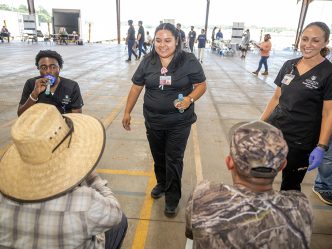The annual Healthy Georgia Report has been released by Augusta University’s Institute of Public and Preventive Health and gives a snapshot of how Georgians stack up against not only neighboring states, but also the country when it comes to a variety of health measures.
This year’s report has added information on adult dental health, mental health, skin cancer and overdose deaths. Information on HIV risk behaviors, breast cancer screenings and colon cancer screenings have also been included. The report is the only one of its kind in the state.
The report has been delivered to lawmakers, community leaders and researchers in Georgia to provide them with statistics on how Georgia is faring in numerous measures of health. The goal is to stimulate conversations about public health needs and, in turn, promote action, such as policy changes, greater community engagement and the appraisal of funds.
Biplab Datta, PhD, assistant professor in IPPH and the Department of Health Management, Economics and Policy, has collaborated with other IPPH faculty and staff to update the report. Datta has seen the impact this can have with state leaders.
“They have a good appetite for data-driven policy changes. I think this report actually helps them in that direction,” said Datta. “We tried to present data in a way that policymakers may find helpful in deciding on appropriate policy choices.”
Overdose deaths is one of the new categories this year and is a growing concern nationwide. The report shows Georgia has the sixth lowest rate of overdose deaths in the country. Datta said that’s good, but the number is trending upward. and now should be the time to take steps to prevent it from getting worse.
“We cannot be satisfied. We are doing a good job but need to be on our toes to prevent it from further ascending,” he said.
“Regarding political will, comparisons to what our neighboring states are doing may motivate us to take necessary actions so that we can do better and make Georgia a better place to live.”
Biplab Datta, PhD
Another category that Georgia is trending in a good direction is cigarette smoking. But the opposite is true for the obesity rate in the Peach State. The data shows Georgia has the 14th highest rate of obesity in all of the U.S., and that number is on the rise.
The data also shows it’s related to household income and education. Adults who are below the federal poverty line and without a college degree are significantly more likely to be obese. Also, those in the 18-to-49 age group have a high rate of obesity compared to the national and regional average.
“That is problematic because if someone is developing some cardiometabolic conditions in this age group, they will be at a high risk for adverse cardiovascular events at an older age. So we need to focus on food habits, physical exercise and other health promoting behaviors to prevent and control obesity,” Datta said.
Another finding relates to those in Georgia who have health insurance coverage. While coverage in adults is second lowest in the nation, there is a slight uptick in the number of people who have coverage from the past few years. The number is much better for children with health insurance. He points out that many state programs like PeachCare for Kids may account for the differences.
Datta said one health concern that definitely needs to be investigated more is cancer rates. He said we observe a low prevalence rate, despite the common perception, and other data sources suggest a relatively higher incidence rate of cancer in Georgia. He believes we may be seeing lower survival rates that are not included in the survey.
“I think we need more investigation into this particular issue,” said Datta. “Why are we seeing such low numbers of cancer prevalence when we know that cancer incidence rates are very high in Georgia?”
With a wide range of measures, the report may lead to some cross-collaboration at Augusta University – not just with the Georgia Cancer Center, but with the Dental College of Georgia and other departments, as well, he said.
“It creates opportunities to work within Augusta University, and I think that’s something we should start thinking about and acting on,” Datta said.
 Augusta University
Augusta University





